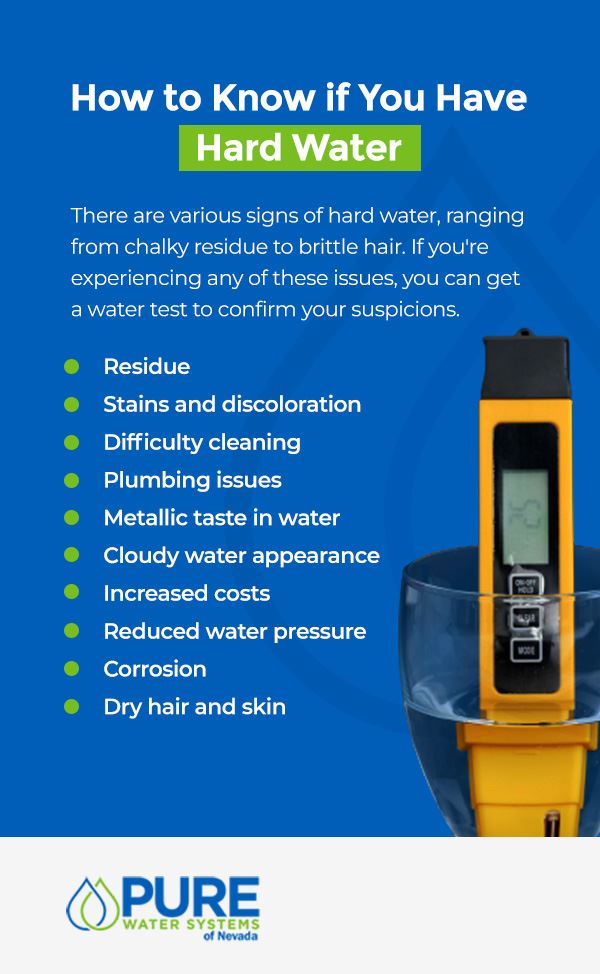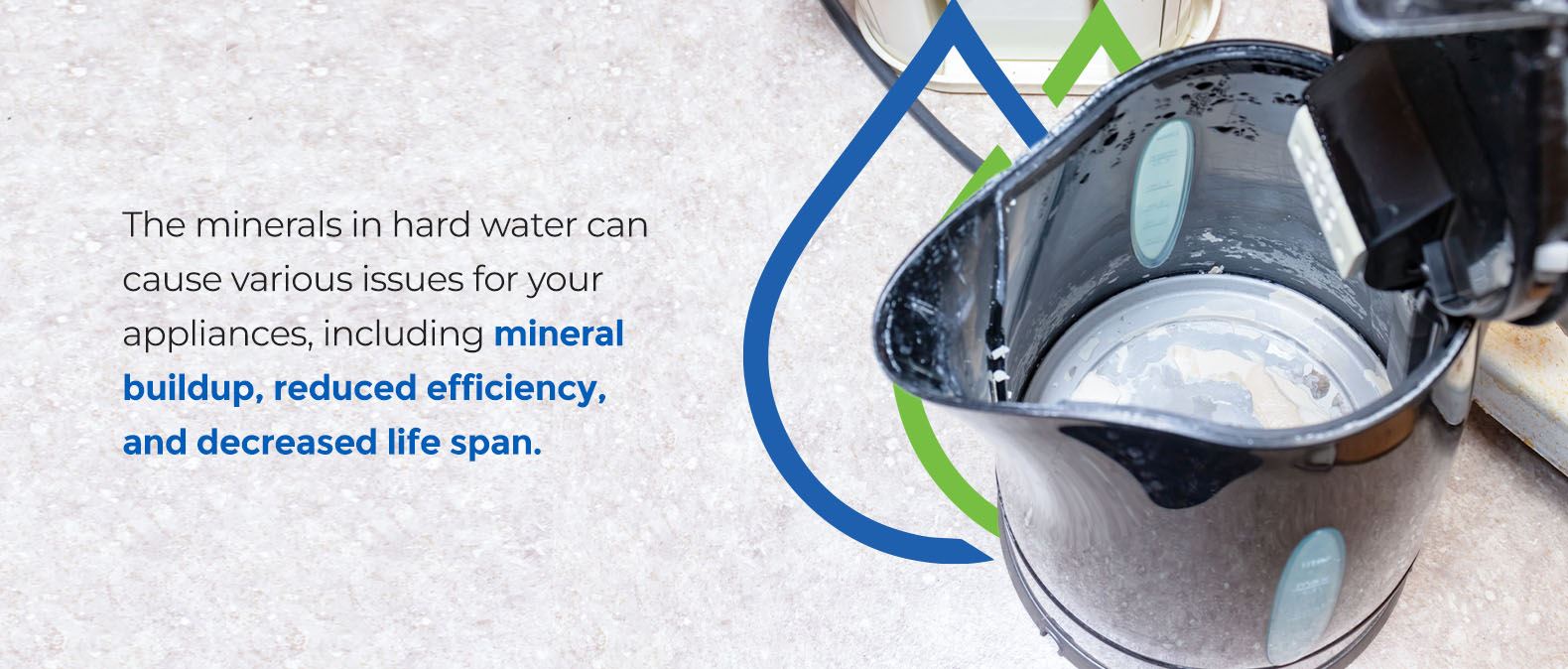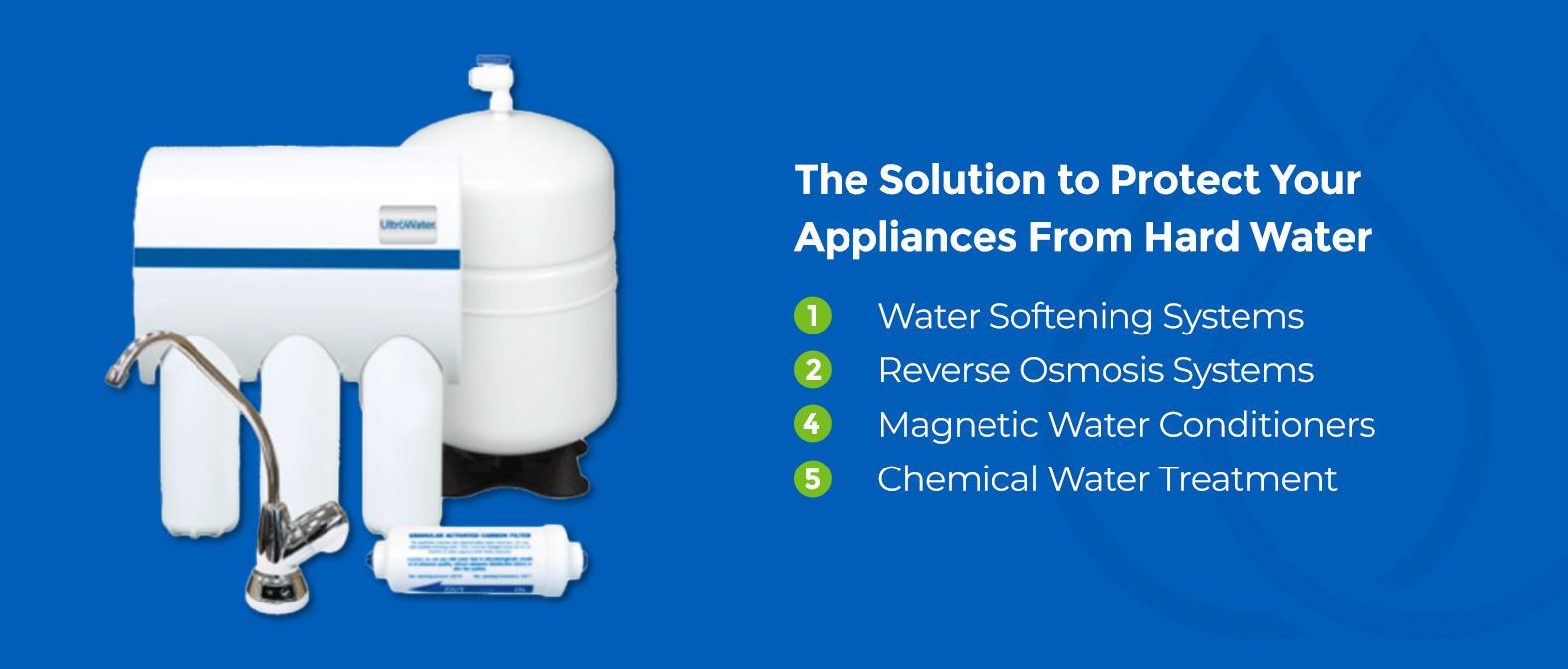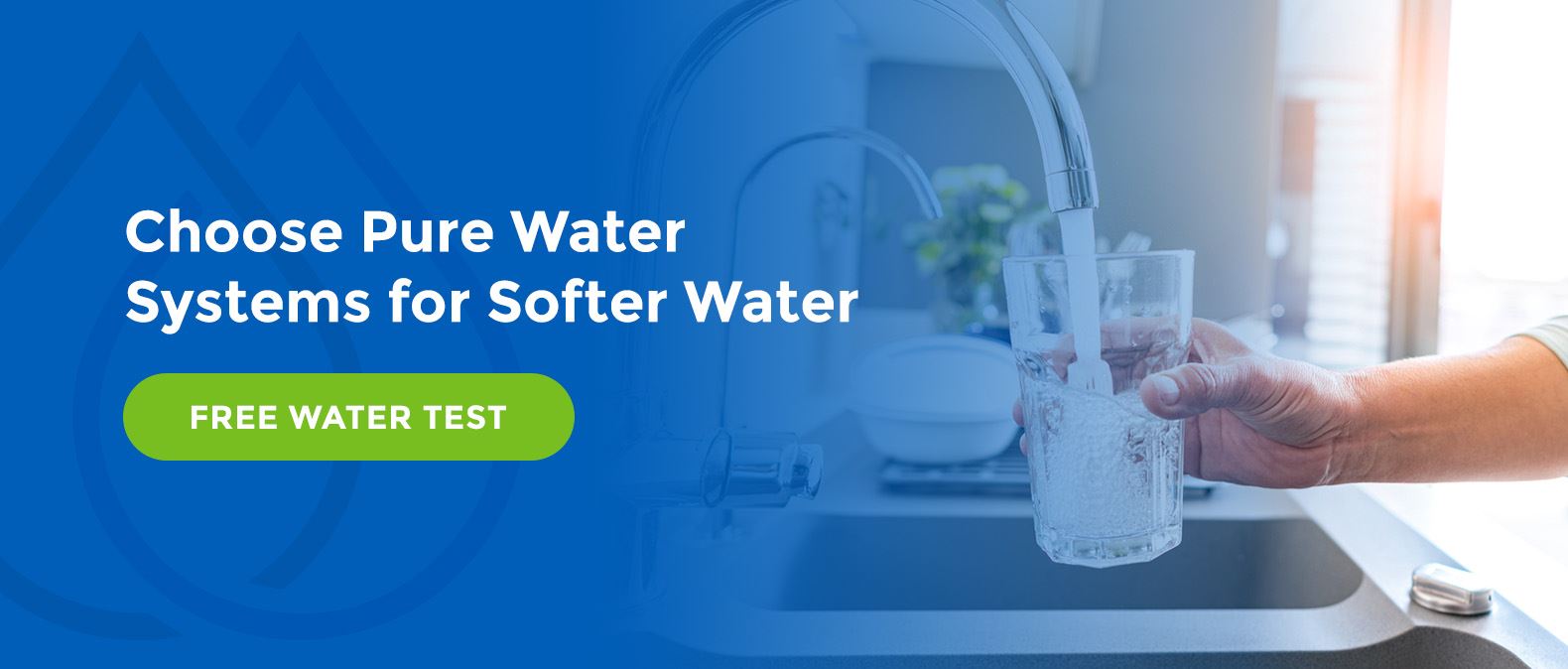Hard water may seem harmless, but it can cause extensive damage. The minerals that make water hard, such as calcium and magnesium, can cause mineral buildup and corrosion in your appliances, reducing their efficiency and life spans. Further, hard water can harm your skin and hair. Hard Water will void most appliance warranties.
Fortunately, there are several solutions for dealing with hard water, including water softeners, filters, and descaling agents. In this article, we’ll take you through what hard water is, different hard water effects on appliances, and several solutions for hard water you can consider.
What Is Hard Water?
You may have heard the term “hard water” before, but what exactly is it? Hard water is water that contains high levels of minerals, such as calcium and magnesium. These naturally occurring minerals are picked up as water passes through rocks and soil on its way to your plumbing system.
Here are some of the specific minerals found in hard water:
- Calcium: The most common mineral found in hard water, calcium makes soap less effective and leaves a white, chalky residue on surfaces.
- Magnesium: Like calcium, magnesium can cause scaling and mineral buildup in pipes and appliances. It can also make it harder for soap to lather, leading to the need for more soap or detergent to get things clean.
- Iron: This mineral can cause reddish-brown stains on surfaces and clothing and a metallic taste in water.
- Manganese: Similar to iron, manganese can cause brownish-black stains and a metallic taste in water.
- Copper: Like the metals above, copper can affect water’s taste. High levels of copper can also be harmful to human health.
- Lead: High lead levels in drinking water can be extremely dangerous. Lead can come from old pipes and plumbing fixtures.
Other minerals found in hard water are nickel, strontium, barium, and zinc. All of these are fine in small amounts and relatively common, but high levels of them can be harmful.
The hardness level of water is measured in parts per million or grains per gallon. Hard water can range from slightly hard to very hard, with levels varying depending on the location and source of the water.
How to Know if You Have Hard Water
There are various signs of hard water, ranging from chalky residue to brittle hair. If you’re experiencing any of these issues, you can get a water test to confirm your suspicions.

- Residue: One of the most common signs of hard water is the presence of white or chalky residue on your faucets, showerheads, and other fixtures. You may also notice a film or scum on the surface of your water, which is caused by soap reacting with the minerals in the water.
- Stains and discoloration: Minerals in hard water react with soap and other cleaning agents, causing them to leave behind stains or discoloration on your clothes, dishes, and appliances.
- Difficulty cleaning: Soap doesn’t lather as well with hard water, so you may notice it takes more time and effort to clean surfaces like your bathtub or sink. The minerals in hard water can interfere with the soap’s compounds and leave behind a residue you have to work harder to remove.
- Plumbing issues: Hard water can cause clogs or reduced water pressure. This signifies the mineral slowly building up in your pipes, reducing water flow through them.
- Metallic taste in water: If your water tastes or smells metallic or has an unusual odor, it could be due to the minerals in hard water. This can also affect the taste of your coffee, tea, and other beverages made using the water.
- Cloudy water appearance: If you have a swimming pool or a hot tub, you may notice the water is cloudy or discolored. This reaction happens when the chlorine or other chemicals used to sanitize the water interact with the minerals in the hard water.
- Increased costs: You may notice increased costs on your utility bills, as it takes longer to heat hard water. Therefore, you may spend more on energy over time to heat your water.
- Reduced water pressure: Mineral buildup occurs in your pipes when you have hard water, slowly restricting water flow. This restriction causes diminished water pressure, making it difficult to shower or run appliances like your washing machine or dishwasher. These blockages can sometimes become so severe that water flow is completely cut off.
- Corrosion: Hard water contains high levels of dissolved minerals that can react with the metal surfaces of your plumbing system. Over time, these reactions can cause corrosion, which can weaken the pipes and cause them to deteriorate. Corrosion can also cause the water to become discolored or contaminated with rust particles.
- Dry hair and skin: The minerals in hard water can cause your skin to feel dry and itchy and can leave your hair feeling dull, dry, and brittle. This happens because the minerals in hard water can react with the natural oils on your skin and scalp, stripping them away and leaving your skin feeling dry and irritated. Similarly, these minerals can leave a residue on your hair, making it feel heavy and difficult to manage.
The Presence of Hard Water in Northern Nevada
If you live in Northern Nevada, the chances are you have hard water flowing through your pipes — much of the United States uses hard water, and Nevada is no exception. Some areas in Northern Nevada are more likely to have hard water due to the region’s geology. For example, the water in the Reno/Sparks area is considered hard.
The reason for Northern Nevada’s hard water, as mentioned, is due to the area’s geology. Water picks up minerals as it passes through the rocks and soil of the region. The region is rich in mineral deposits, and water sources, such as the Truckee River, are naturally high in minerals. The Truckee River serves as one of Reno’s primary drinking water source. The river water is blended with over 100 public wells which produce extremely hard water and high levels of arsenic.
While certain areas are more likely to have hard water, it’s important to note that the hardness level of water can vary even within the same city or town. Get your water tested by a professional to determine the exact hardness level and the best course of treatment.

The Effects of Hard Water on Washing Machines
One of the main issues related to hard water is that mineral buildup can damage your washing machine’s heating element, reducing its efficiency and increasing energy bills. The scaling buildup can also make it harder to clean clothes and even leave them looking dingy and gray.
Clogging is another issue that directly affects washing machines. Clogging leads to a backup of water in the machine. The blockage can cause leaks and even flooding, which can be expensive to repair.
The Effects of Hard Water on Dishwashers
Hard water can slowly start to clog the thinner, smaller water sections in the spray arms of a dishwasher. The water can’t penetrate through the existing holes and prevents water from reaching all the dishes, leading to poor cleaning results.
Another issue with hard water and dishwashers is the formation of white spots or streaks on dishes and glassware. The marks are caused by the minerals in hard water that can’t be dissolved entirely and instead leave deposits on the surfaces of dishware and glasses.
Furthermore, hard water can affect the efficiency of dishwasher detergent. Hard water minerals can combine with the detergent, making it less effective and reducing its ability to clean dishes properly. You’ll likely need to use additional detergent as a result.
The Effects of Hard Water on Water Heaters
Hard water causes many problems with water heaters, specifically those with a tank to store and heat water. The minerals in hard water can accumulate in the bottom of the tank, forming a layer of sediment. Over time, this sediment layer can become thicker and harder, reducing the efficiency of the water heater and increasing energy bills.
Sediment buildup can also cause the water heater to make unusual noises, such as popping or cracking, as it heats the water. In addition, the mineral deposits in hard water can cause corrosion and damage the water heater’s heating element, reducing its life span and efficiency. Corrosion can lead to leaks and other types of damage, requiring costly repairs or replacements.

The Solution to Protect Your Appliances From Hard Water
If hard water is ruining your home’s appliances, you have many solutions to consider. Here are several common ways to combat hard water in your house:
1. Water Softening Systems
Water softening systems are one of the most popular solutions for hard water. These systems work by removing the minerals that cause hard water, such as calcium and magnesium, through a process called ion exchange. The system uses resin beads to attract and remove the minerals, leaving you with soft, clean water.
2. Reverse Osmosis Systems
Reverse osmosis systems force water through a semi-permeable membrane to remove impurities, including minerals that cause hard water. These systems are effective at removing minerals and require professional installation.
3. Magnetic Water Conditioners
Magnetic water conditioners are an alternative to traditional water-softening systems. These systems use magnets to alter the molecular structure of the minerals in the water, making them less likely to cause buildup and damage to your appliances and plumbing.
Magnetic water conditioners are the most cost-effective than traditional methods. Still, they’re less effective than other solutions and are best for areas with lower mineral content levels.
4. Chemical Water Treatment
Chemical water treatment is another option for fixing hard water. This treatment involves adding chemicals to the water to prevent minerals from forming buildup and damaging your appliances and plumbing. While this solution can be effective, it may only be suitable for some types of plumbing systems.
Contact a local water systems expert to assess your water and determine which option is right for you. Some of these solutions only work for specific situations, so it’s best to work with a professional to ensure you fix your hard water correctly.
Choose Pure Water Systems for Softer Water
Working with a professional water filtration company like Pure Water Systems is essential when assessing and installing water systems to fix hard water problems. We have the knowledge and experience to properly address your hard water issues in Northern Nevada.
Attempting to fix hard water problems alone can lead to costly mistakes and potentially worsen the situation. Our team of qualified water experts can test your water to determine its mineral content and recommend the most effective treatment option for your situation. We can ensure your filtration system is installed correctly to ensure you have clean, safe, and soft water.
By relying on the expertise of Pure Water Systems, you can trust that your hard water issues will be resolved efficiently and effectively. Request a free water test from our team today to take the next step toward getting softer water for your house.


